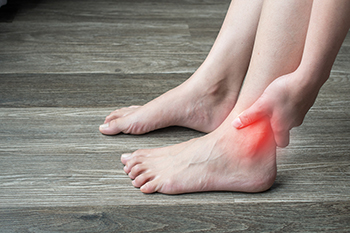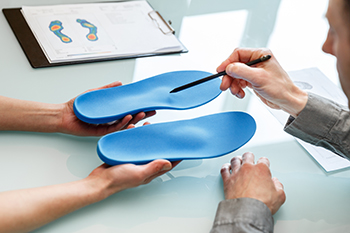
Rain or shine, snow or sleet, Custom Orthotics have your feet covered! As the seasons change, ensure your steps remain comfortable and supported. Custom Orthotics adapt to your footwear, from summer sandals to winter boots, providing consistent relief and alignment. Don't let the changing weather dictate your foot comfort. Step confidently year-round and experience the difference with Custom Orthotics. Call today for more information.

Lateral ligament injuries occur when the ligaments on the outside of the ankle are stretched or torn, often due to a sudden twist, fall, or awkward landing. These injuries are common in athletes, especially those involved in sports requiring quick direction changes, such as basketball, soccer, pickleball, and tennis. However, anyone can experience a lateral ligament injury from an unexpected misstep or walking on uneven ground. Symptoms include swelling, bruising, pain, and instability in the ankle. Mild sprains may heal with rest, compression, and elevation, while more severe tears might require bracing or targeted exercises to restore strength and flexibility. Without proper treatment, repeated injuries can lead to chronic instability and long-term weakness. Strengthening exercises, balance training, and wearing supportive footwear can help prevent recurrence. If pain persists or instability affects movement, it is suggested that you see a podiatrist for an accurate diagnosis and a tailored recovery plan.
Ankle pain can have many different causes and the pain may potentially be serious. If you have ankle pain, consult with one of our podiatrists from Manhattan Footcare. Our doctors will assess your condition and provide you with quality foot and ankle treatment.
Ankle pain is any condition that causes pain in the ankle. Due to the fact that the ankle consists of tendons, muscles, bones, and ligaments, ankle pain can come from a number of different conditions.
Causes
The most common causes of ankle pain include:
- Types of arthritis (rheumatoid, osteoarthritis, and gout)
- Ankle sprains
- Broken ankles
- Achilles tendinitis
- Achilles tendon rupture
- Stress fractures
- Tarsal tunnel syndrome
- Plantar fasciitis
Symptoms
Symptoms of ankle injury vary based upon the condition. Pain may include general pain and discomfort, swelling, aching, redness, bruising, burning or stabbing sensations, and/or loss of sensation.
Diagnosis
Due to the wide variety of potential causes of ankle pain, podiatrists will utilize a number of different methods to properly diagnose ankle pain. This can include asking for personal and family medical histories and of any recent injuries. Further diagnosis may include sensation tests, a physical examination, and potentially x-rays or other imaging tests.
Treatment
Just as the range of causes varies widely, so do treatments. Some more common treatments are rest, ice packs, keeping pressure off the foot, orthotics and braces, medication for inflammation and pain, and surgery.
If you have any questions, please feel free to contact our offices located in Manhattan and Brooklyn, NY . We offer the newest diagnostic and treatment technologies for all your foot care needs.

Custom orthotics are a game-changer for figure skaters, offering critical support for posture and performance. Skaters rely heavily on precise alignment and balance to execute intricate jumps, spins, and footwork. Custom orthotics address individual foot biomechanics, correcting imbalances like overpronation or high arches that can disrupt posture. By stabilizing the feet, orthotics align the ankles, knees, hips, and spine, improving overall posture and reducing the risk of injuries. They help evenly distribute weight, minimizing strain on joints and muscles during intense skating routines. Enhanced posture not only prevents fatigue but also boosts elegance and control, essential for competitive skaters. Orthotics also cushion the impact of jumps, reducing stress on the lower body. If you are a figure skater aiming to refine your posture and protect your body, it is suggested that you visit a podiatrist to discuss whether custom orthotics can help you.
If you are experiencing discomfort in your feet and would like to try custom orthotics, contact one of our podiatrists from Manhattan Footcare. Our doctors can provide the care you need to keep you pain-free and on your feet.
What Are Custom Orthotics?
Custom orthotics are inserts you can place into your shoes to help with a variety of foot problems such as flat feet or foot pain. Orthotics provide relief and comfort for minor foot and heel pain.
Over-the-Counter Inserts
Shoe inserts come in a wide variety and are used to treat foot pain, heel pain, and minor problems. For example, arch supports can be inserted into your shoes to help correct overarched or flat feet, while gel insoles are often used because they provide comfort and relief from foot and heel pain by alleviating pressure.
Prescription Orthotics
If over-the-counter inserts don’t work for you or if you have a more severe foot concern, it is possible to have your podiatrist prescribe custom orthotics. These high-quality, custom inserts are designed to treat problems such as abnormal motion, plantar fasciitis, and severe forms of heel pain. They can even be used to help patients suffering from diabetes by treating foot ulcers and painful calluses and are usually molded to your feet individually, which allows them to provide full support and comfort.
If you're experiencing minor to severe foot or heel pain, it’s recommended to speak with your podiatrist about the possibility of using custom orthotics or shoe inserts. A podiatrist can determine which type of custom orthotic or shoe insert is right for you and help you take the first steps toward being pain-free.
If you have any questions please contact our offices located in Manhattan and Brooklyn, NY . We offer the newest diagnostic and treatment technologies for all your foot and ankle needs.


